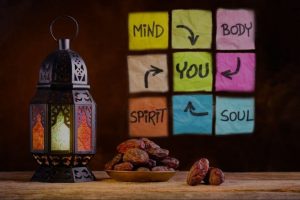
All praise belongs to Allah! We are passing through the blessed month of Ramadan with the hope and prayer that Allah will shower His mercy on us and alleviate us of this trial of Covid-19. Ramadan is a holy month for Muslims all around the world. As a clinical nutritionist, I am particularly intrigued by the process of fasting and what food we consume during this month and the impact it has on our bodies.
As a nutritionist working in the sub-continent, I came across patients from all income groups; from very poor to low middle-class and high-middle class, as well as affluent people. For example, whenever I advised those from poorer backgrounds to eat fruits, which is an essential part of a healthy diet, I often saw tears in their eyes. I would therefore help them to budget to adjust their lifestyle so they could afford healthy foods. For example, take a labourer who I knew already consumed a packet of biscuits in the morning. I would persuade them that instead of buying biscuits, buy an apple, or two guavas or two to three bananas with the same money and so on. In this way, they could benefit from a healthier diet without having to spend more than they already did.
In this article, I have tried to provide very simple dietary advice, which people from lower income groups can adopt. However, it has always been my advice to those who can afford it or are from higher income groups, to also make their menus simple and healthy, as I have found that simple foods are the essence of healthy and immune-boosting diets. People can truly benefit spiritually and physically in this month of Ramadan if they eat a simple, yet healthy diets.
Fasting – according to numerous new researches – is a natural and effective way to enhance immunity and fight inflammation (1, 2). All organs are able to rest and regenerate while the body detoxifies itself (3). Thus, a person may be able to get rid of degenerative diseases and enhance their immune system, so long as they are not suffering from Covid-19 or other any other disease, as the Qur’an, forbids the ill from fasting (4).
As a nutritionist, I advise my patients that fasting is a very beneficial way to improve not only our spiritual health but also our physical health. Yet, I have witnessed many who end up harming their health in Ramadan. This is due to unhealthy eating habits during this month, especially at the time of Iftar (breaking of the fast). It was my personal observation that I would find many new heart patients at the Tahir Heart Institute suffering from heart attacks after Eid, the Muslim festival that arrives to mark the end of Ramadan. After interviewing them I concluded that most people in our culture break their fast with soft drinks (thinking of soda or a mixture of milk and soda to be a healthy drink).
Many also love to include fried items in their Iftar meals. In fact, our bodies are ever ready to absorb nutrients after fasting and being on an empty stomach. Because of this science, very healthy food options or herbs are usually suggested by Ayureds and Hakeems in sub-continent to be taken at pre-breakfast times. Since very healthy foods have an advantage of providing more nutrients on an empty stomach, whereas unhealthy foods harm the body most when eaten on an empty stomach, it would be wise to be very careful about what we are eating at the time of Iftar. Otherwise, this golden opportunity provided by God to improve our health may be lost.
In Ramadan, we start with Sehri (the pre-dawn meal to start the fast) which is the most important meal of the day for keeping our bodies running. The Holy Prophet Muhammad (sa) advised having Sehri as it is a source of blessings (5). One of the big mistakes many people make, especially those who are conscious of their weight, is to have very little food at this time. Sehri, like breakfast, is very important for providing energy for a long day of work and worship. A good Sehri not only gives us energy but also helps us to avoid indulging in unhealthy Iftars. By keeping better self-control over food choices at Sehri and Iftar time, we can help maintain better weight. Sehri, like breakfast, provides and uses calories while eating late at night stores calories resulting in weight gain and poor gut and health.
At Sehri time, it is wise to have one or two whole wheat chapatis (an unleavened flatbread originating from the Indian subcontinent) to help provide energy for a long day. Chapatis or some other sources of slow-releasing carbohydrates, like whole-wheat bread, provide slow-releasing energy for a whole day of fasting. Chapatis should be moderately heated with extra virgin olive oil (or Desi ghee [clarified butter] if living in South Asian countries). Both olive oil and clarified butter have anti-viral properties (6, 7). Leftover chapatis are a good choice for dinner, as fermentation increases bio-availability of vitamin B. If chapatis are unavailable, then whole wheat bread is a good alternative. An omelette (green onions, or tomatoes, green chillies and spinach may be added to improve anti-oxidants) or leftover curry from dinner is a good choice.
Yoghurt or a yoghurt-based drink is a great help to quench our thirst for the entire day. Another way of keeping hydrated is to avoid sugary drinks and foods at Sehri. In our culture, we have a habit of eating yoghurt by adding a lot of sugar in it. Instead, we can lightly sprinkle salt (organic sea-salt or a coarse variety of pink Himalayan salt, not table salt for cooking and other purposes) or add honey as a sweetener, which will enhance immunity. Adding chia seeds is another way of keeping hydrated. Barley porridge is also an excellent choice with milk, water and honey (Talbina was one of the favourite foods of Holy Prophet (sa). He recommended it as medicine for any illness (8). This should not be ready-made. It should be in the form as we find in South Asian chakkies (traditional flour mills), which we have to cook for a while. One may obtain it from Desi or health stores in the West.) Ready to eat cereals are included in processed foods and are not a good choice, no matter how many vitamins have been added to them.
We usually eat dates at Iftar as is the sunnah (practice of the Holy Prophet (sa)). Adding two to three dates at Sehri will help keep us energetic all day and keep our immune system strong which is also proven by sunnah. Dates are not only a good source of carbohydrates, but also contain good amounts of magnesium, vitamin B6, iron, manganese and copper which help fight infections (9). Those who have a habit of drinking tea or coffee are advised to do so at Sehri.
It is ill-advised to indulge in over-sleeping during the day, but rather should have a productive and energetic day. At the same time, we should also try to conserve our energy by avoiding more physically taxing activities, avoiding excess sweating. When patients asked me about exercise while fasting, I would tell them that it is always a good idea to walk for fifteen to thirty minutes after preparing Iftar. While walking, one can also make use of the time before Iftar in reciting Durood Shareef (sending salutations upon the Holy Prophet (sa)) along with various other prayers. This is a safer time for going on a walk so as not to lose our energy or put our fast at risk.
As I mentioned earlier, breaking our fast with healthy foods and avoiding unhealthy foods is of the utmost importance for our immune systems. What I suggest is to break one’s fast with dates or water as taught by the practice of the Holy Prophet (sa). Then have some fruit, perhaps in the form of fruit chaat (a mixture of fruits and spices). While making fruit chaat, try using homemade chaat masala rather than store-bought. If then is not possible then black pepper, salt, lemon and honey dressing is good. Fresh fruit salad is also a good option. One can also have fruits like watermelon, cantaloupe and so on. Another choice is to have channa chaat or black gram chaat, with onions, tomatoes, cucumber, celery and so on, with lemon or tamarind which are all good sources of vitamin C and anti-oxidants.
Fresh juice or smoothies with strawberries or other fruit can be prepared at home and honey should be used instead of sugar. One can also make a simple mixture of honey and water, which was the preferred drink of the Holy Prophet (sa) (10). One can also have bone broth or any soup with immunity-boosting seasonings. Any one of the above choices with a healthy drink is good enough for our digestive system to get ready for dinner. It is also the practice of the Holy Prophet (sa) to eat fruit before meals rather than having fruit as a dessert after meals like we normally would. Eating fruit before meals help to secrete digestive enzymes and helps in digesting meals. Also, increasing satiety helps with weight reduction (11).
After a simple Iftar, the interval of 15-20 minutes taken for Salat (prayer) helps in getting our digestive system ready for a meal after the long period of fasting. After the prayer, one should have a simple dinner. Remember, simple foods are better digested, and enhance immunity. Dinner should not be eaten late as digestive enzymes start diminishing. Food may be prepared in coconut oil or clarified butter; both have anti-viral, anti-fungal and anti-bacterial properties. Liberal use of turmeric is recommended especially during this period of Covid-19. Homemade green chutney made of cilantro and mint may aid digestion. Having apple cider in a glass jar with onions, ginger, garlic, cayenne pepper or green chillies also strengthens our gut and immune system. After dinner, one can have green tea, star anise, cinnamon, black clove and green cardamom tea. If one gets insomnia after drinking green tea, chamomile or lemongrass tea are a good choice for relaxing the body.
So, a little care in our diet choices and lifestyle can keep our bodies balanced. Once, the Fourth Caliph of the Ahmadiyya Muslim Community, His Holiness, Hazrat Mirza Tahir Ahmad (rh) mentioned that viruses or bacteria only take control of one’s body when the balance of our bodies is out of proportion (12).
May Allah have mercy on all mankind and help us elimante this virus and alleviate the suffering of those impacted.
End Notes
- Cheing Wei-Cia, et al,” Prolonged Fasting reduces IGF-1/PKA to promote hematopoietic stem cell-based regeneration and reverse immunosuppression”, Cell stem cell 14(6) [June 2014] 810-823
- Fasting For Three Days can Regenerate Entire Immune System, Study Finds. (2019) Retrieved from https://www.flowin.com/index.php?page=blog_post&blog_id=79
- Dockrill, Peter, Fasting For Just 24 Hours Boosts The Regeneration of Stem Cells, Study Finds. (2018) Retrieved from https://www.sciencealert.com/fasting-for-just-24-hours-boosts-the-regeneration-of-stem-cells-study-finds-intestine-longevity
- Holy Quran Surah Al-Baqra Chapter 2, verse no 185
- Sahi Muslim (1095)
- Omar Haris Syed,” Oleuropein in Olive and its Pharmacological Effects”,Scientia Pharmaceutica; 78(2) (April 2010) 133-154
- Retrieved from www.ecpi.edu
- Hussain Shahid Syed,Tib-e-Nabwi (SAW) mein Talbinah (Jau ka Dalia) ki Ahmiat (December 2019) Retrieved from www.express.pk
- Elliott Brianna, RD, “8 Proven Health Benefits of Dates. Healthline (March 2018) Retrieved from https://www.healthline.com/nutrition/benefits-of-dates
- Al-Hakam May, 1935
- Flood-Obbagy E. Julie and Rolls J. Barbara, “The effect of fruit in different forms on energy intake and satiety at a meal”, Appetite; 52(2) (April 2010) 416-422
- Hazrat Khalifah Rabeh Dars-e-Quran




Add Comment